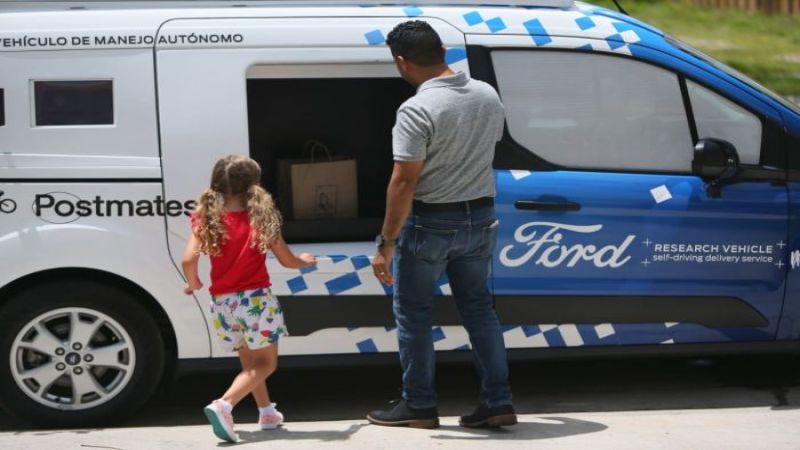Ford is partnering with the delivery service called Postmates to research how to best operate a self-driving delivery service. Don’t worry, for now the Transit Connect Vans they are using have drivers on board, but they are working the bugs out of the system so that the vans could begin self-driving by 2021. You may remember that Ford previously talked about a self-driving pizza delivery vehicle.
Ford and Postmates are currently running the research vans in Miami and Miami Beach. Postmates is an on-demand delivery platform that will deliver virtually anything, in this example, it is being used to deliver food.
Ford Designed a Special Test Vehicle
Ford designed a Transit Connect specifically for this pilot program. It is divided into several lockers, so it can serve multiple customers on one delivery route.
Additionally, delivery services handle deliveries of different shapes and sizes, so the Transit Connect has different sized lockers, so they can study what is the best layout for the van.
Ford is really looking at what happens in the first and last mile of the delivery experience. They want to determine how businesses and customers interact with a self-driving vehicle.
Ford stresses that the research vehicles for these business pilots are designed to appear as self-driving, however, they are manually driven by an experienced driver. They are developing the self-driving technology in separate test vehicles.
How it works
Using a food delivery as an example, the delivery process starts when the restaurant employee types his access code into a screen on the side of the vehicle. One of the lockers will automatically open so that he can place the food inside. Each locker even has two cup holders so that you don’t have to worry about your beverage spilling in transit.
When the vehicle arrives at its destination, the customer receives a text notification indicating the delivery is ready for pickup.
The customer comes outside and enters an access code into the touch screen and the appropriate locker will open. Audio prompts will tell the customer what to do and lights will illuminate the designated locker. Ford is trying to make the interactions with the vehicle as easy as possible through various technologies built into the Transit Connect.
This is Ford’s first self-driving research vehicle modified specifically to test a variety of interfaces — the touch screen, the locker system, the external audio system— to figure out how to best design the real self-driving vehicle that’s scheduled to arrive in 2021.
Ford and Postmates are using this pilot program to test methods for efficient deliveries to help local businesses expand their reach and provide an easy experience for customers.
The Ford and Postmates pilot is currently underway in Miami and Miami Beach with more than 70 businesses participating, including local favorites. Residents in the area, who use Postmates, may be given the option to have their items delivered by a self-driving research vehicle.
I’m sure Ford and Postmates will use the experience to iron out the problems that typically plague delivery services. How can you guarantee that the ordered item actually makes it into the vehicle on the front end, and how can you make sure that it safely gets to its destination and the person who ordered it. Once you figure out those details, you can use a self-driving vehicle for virtually anything, whether you are transporting cargo, food or even people.
As the auto companies are testing more and more of the autonomous vehicles, more and more states are enacting legislation to monitor those activities. The National Conference of State Legislatures is also monitoring what the different states are doing about the vehicle testing and how to regulate it. Ford is still using drivers in these tests, so it isn't as problematic as full autonomous vehicle testing.
Set Torque News as Preferred Source on Google











